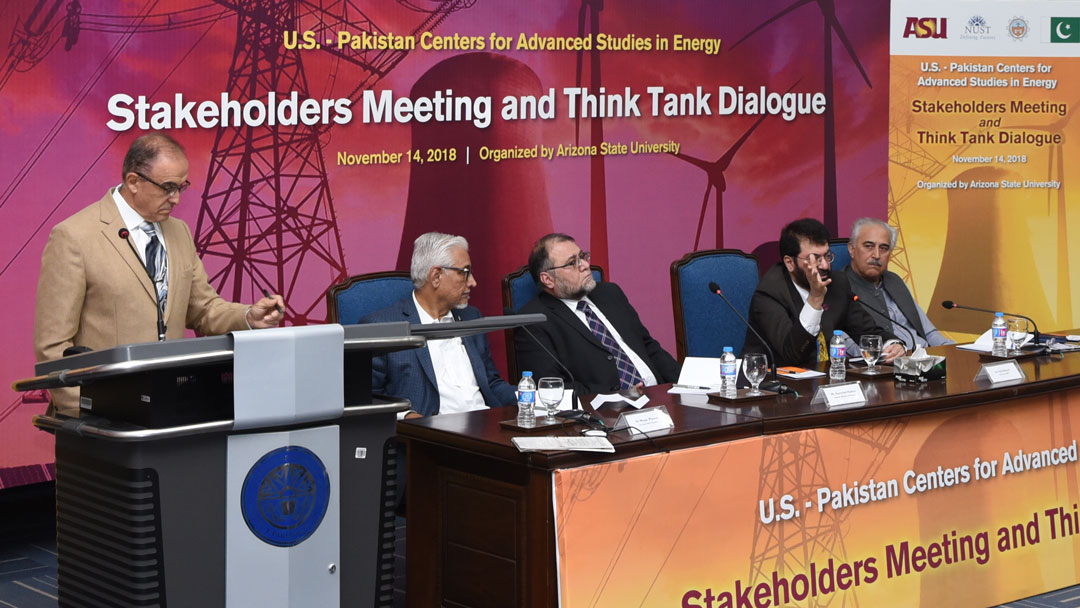Engaging Stakeholders, Creating Connections

USPCASE organized their 5th National Stakeholders Meeting on Energy and 2nd Think Tank Dialogue and in Islamabad, Pakistan.
[et_pb_section bb_built=”1″ admin_label=”section”][et_pb_row admin_label=”Row” background_position=”top_left” background_repeat=”repeat” background_size=”initial”][et_pb_column type=”4_4″][et_pb_text admin_label=”Text” _builder_version=”3.0.51″ background_layout=”light” text_orientation=”left” border_style=”solid”]
The ongoing engagement of stakeholders is key to the success of the USPCASE project
[/et_pb_text][/et_pb_column][/et_pb_row][et_pb_row admin_label=”row” background_position=”top_left” background_repeat=”repeat” background_size=”initial”][et_pb_column type=”4_4″][et_pb_text admin_label=”Text” _builder_version=”3.0.51″ background_layout=”light” text_orientation=”left” border_style=”solid”]
In November 2018, the U.S.-Pakistan Centers for Advanced Studies in Energy (USPCASE) organized their 5th National Stakeholders Meeting on Energy and 2nd Think Tank Dialogue in Islamabad, Pakistan. The consultative session was attended by 100 participants including senior officials from the United States Agency for International Development (USAID), industry, academic partners and various government agencies in Pakistan, including the Higher Education Commission (HEC).
Led by Arizona State University, the event provided the USPCASE centers with a forum to share updates on academic programs and ongoing applied energy research.
Forging a path to a sustainable future
The Think Tank Dialogue session provided a platform to discuss strategies to enhance cooperation and address Pakistan’s energy needs. Think Tank panelists included Dr. Tariq Banuri, Chairman HEC; Mr. Himayat Ullah Khan, Advisor Energy KP Government; Dr. Waqar Masood, Ex. Secretary Finance; and Mr. Hammad Hashmi, Advisor Ministry of Energy.
Moderated by Dr. Sayfe Kiaei, USPCASE Project Director (ASU), the Think Tank Dialogue focused on the role of academia in energy policy development.
Speaking at the forum, Dr. Tariq Banuri, Chairman HEC, said that USPCASE centers can become sustainable through sponsored research, consultancy services, corporate investment, and philanthropic and public funds. Stakeholder engagement and feedback from all sectors—the energy industry, government agencies, NGOs and other funding agencies—is key to long-term viability and success.
The second panel discussion, moderated by Mr. Ammar Yasser, USPCASE Corporate Engagement Specialist (ASU), focused on the impact and sustainability of the centers. The panelists included Mr. Amjad Ali Awan, CEO Alternative Energy Development Board; Dr. Baqer Raza, Director General Pakistan Council of Renewable Energy Technologies; Mr. Ashfaq Mahmood, Ex. Secretary Ministry of Water & Power; Dr. Parvaiz Naim, Advisor KfW; and Mr. N. A. Zuberi, CEO Three Georges South Asia Investment Limited. They deliberated on issues such as the role of energy centers in international projects, the impact of international funding, the centers’ role in advancing renewable energy in Pakistan, and building the capacity of the energy sector at the national level.
Showcasing graduate student research
The one-day meeting also featured over 30 student research posters that showcased cutting-edge energy research being conducted by USPCASE faculty and their students at both National University of Sciences and Technology and University of Engineering and Technology Peshawar.
The visiting stakeholders provided technical feedback on the research projects that have the potential to be commercialized.
In her closing remarks, Ms. Asima Rehman, Senior Education Advisor USAID/Pakistan noted the accomplishments of the USPCASE program and particularly the linkages that have been developed among universities, industry partners and government agencies.
A partnership to energize Pakistan
The USPCASE program is a partnership between NUST and UET Peshawar and ASU that focuses on building relevant energy expertise and bandwidth to address Pakistan’s energy needs. Under the umbrella of the HEC and with guidance from ASU, the centers have initiated applied research projects, developed curricula based on international best practices, established new state-of-the-art laboratories, and participated in exchange programs.
These centers are working to become Pakistan’s premier sustainable energy research centers and think tanks. The centers are already delivering on that promise and are on track to produce hundreds of skilled graduates equipped with hands-on experience in the latest renewable energy technologies. These graduates will help to jumpstart Pakistan’s energy sector. In addition, USPCASE is providing more than 200 scholars with the opportunity to enhance their research skills and expand their professional networks through international exchange programs at ASU. USPCASE faculty are conducting nearly 50 research projects that are focused on finding immediately actionable solutions to improve energy access for people throughout Pakistan and enhancing the quality of life for all.
[/et_pb_text][/et_pb_column][/et_pb_row][/et_pb_section]